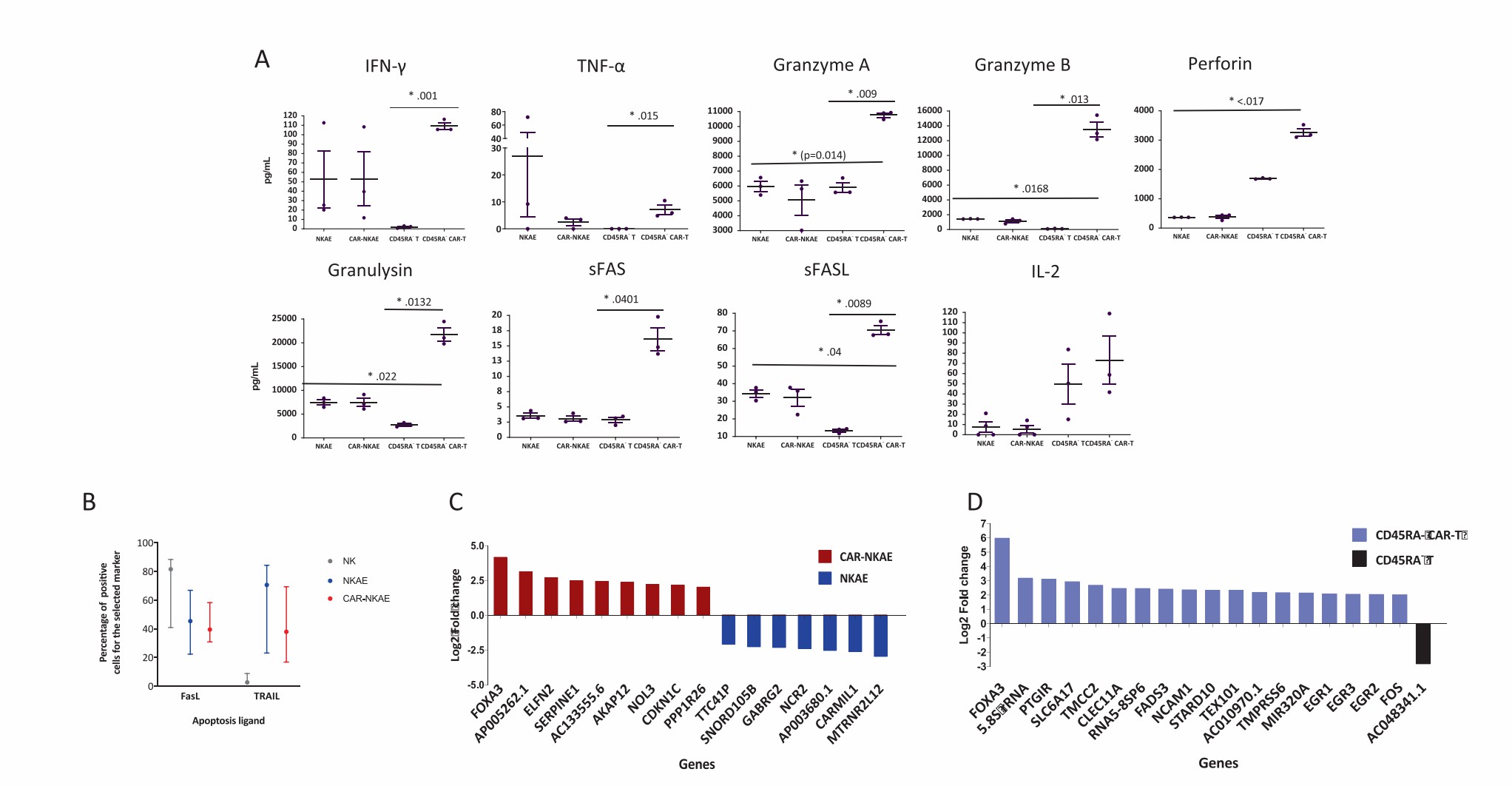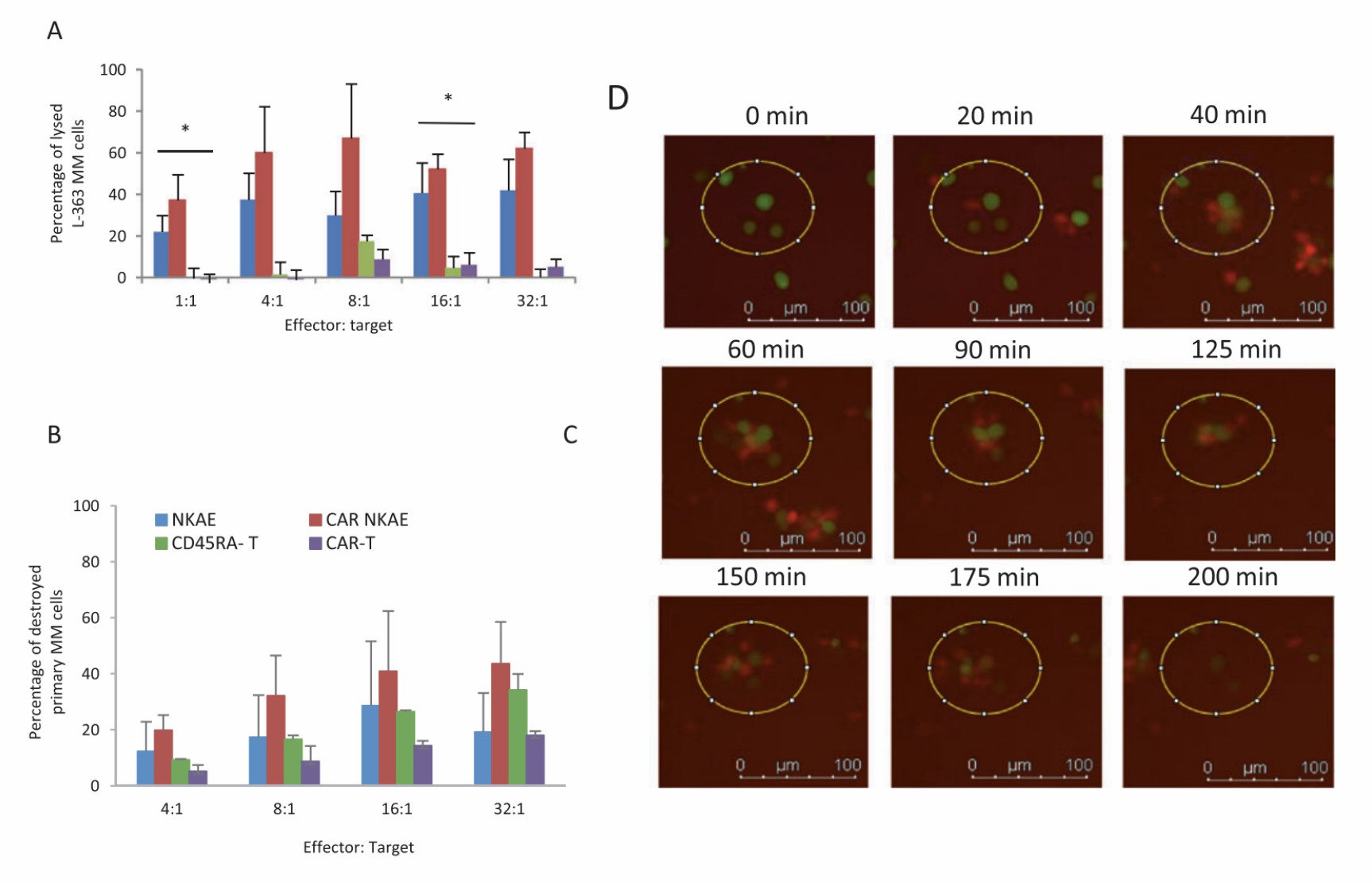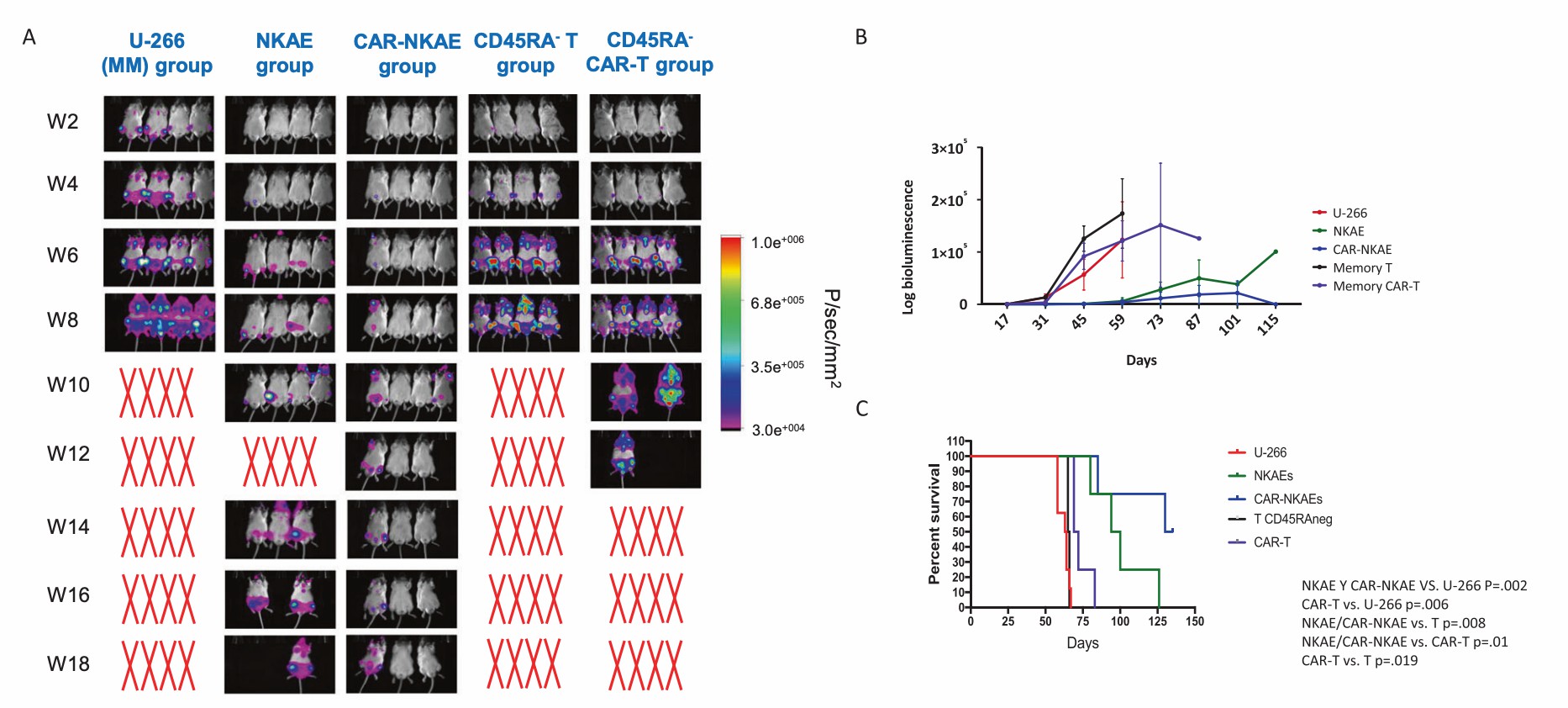All products and services are For Research Use Only and CANNOT be used in the treatment or diagnosis of disease.
CAR therapy is an attractive strategy for cancer treatment. CAR-NK cells are promising immunotherapy for multiple myeloma patients due to strong cytotoxicity to tumor cells and weak side effects to normal cells. NKG2D ligands show an increased expression in a large proportion of cancers and can be targeted by NKG2D expressed in NK cells and most T cells. In this article, researchers developed autologous NKG2D-CAR-NK cells for MM patients. This CAR-NK cell performed greater cytotoxicity to myeloma cells in vitro and efficiently repressed tumor growth in mouse models. This activated CAR-NK cell therapy demonstrates superior anti-tumor efficacy than cognate CAR-T cell, which supports that this strategy is a functional approach for MM patients.
Multiple myeloma is malignant plasma cell-induced cell aberrant expansion in the bone marrow and extramedullary locations. Though novel therapeutics have been developed to improve the survival rate of patients, relapse often occurs as a challenge. While CAR-T cell therapy is highly efficient in leukemia, the associated side effects are threatening. NK cells are short-lived, and the cytotoxicity is balanced by the stimulatory and inhibitory receptors, indicating that CAR-engineered NK cells are safer and more efficient than CAR-T therapy.
Inspired by the good clinical response of the adoptive transferred activated and expanded NK cells and broad expression of NKG2D ligand on B cells of MM patients, scientists try to transduce NKG2D-CAR to NK cells to enhance their anti-tumor efficacy. The NKG2D-based CAR construct is introduced to activated NK cells and memory T cells by a lentiviral vector, and 20.65% CAR+ NK cells and 52% CAR-T cells are detected. CAR-NK and CAR-T cells both present an activated phenotype and retain the genomics features of corresponding origin cells.
 Fig.1 NKG2D CAR expression levels on T cells and NK cells.1
Fig.1 NKG2D CAR expression levels on T cells and NK cells.1
 Fig.2 Phenotype of T and NK cells before and after CAR transduction.1
Fig.2 Phenotype of T and NK cells before and after CAR transduction.1
CAR-NK cells are verified to exhibit greater cytotoxicity over parent NK cells and show 100% killing efficiency at a low effector-to-target ratio. The effect of CAR-NK cells is dependent on the expression level of NKG2D ligands on cancer cells.
 Fig.3 Cytotoxicity of NKG2D CAR-T and CAR-NK cells against myeloma cells.1
Fig.3 Cytotoxicity of NKG2D CAR-T and CAR-NK cells against myeloma cells.1
With advanced transcriptome analysis, researchers find that CAR-NK and CAR-T cells have the same cytokine secretion spectrum, including IFNg, TNFa, granzyme A, granzyme B, perforin, granulysin, sFas, and sFasL. The cytokines expression and cell activation are significantly higher in CAR-T cells. Gene expression assay also elucidates the anti-tumor mechanism of action on CAR-NK cells is related to improved cell activation, migration, and effector process, which is relatively lower in CAR-T cells.
 Fig.4 Mechanism of action on NKG2D CAR-T and CAR-NK cells.1
Fig.4 Mechanism of action on NKG2D CAR-T and CAR-NK cells.1
Luciferase transduced U-266 cell line is used to develop a myeloma mouse model. CAR-NK cells display a strong in vivo anti-tumor efficacy against myeloma cells and prolong the survival time of tumor-loaded mice two times longer than the control and CAR-T group. The CAR+ cells are detected 20 days after infusion with a lower proportion in peripheral blood and much lower in bone marrow with high NKG2D and effector process-related proteins expression.
 Fig.5 NKG2D CAR-NK cells show robust anti-myeloma activity in vivo.1
Fig.5 NKG2D CAR-NK cells show robust anti-myeloma activity in vivo.1
Though NK and CAR-NK cells have similar toxicity to lung, colon, and PBMC in vitro, they did not show significant GvHD against multiple organs in mice, indicating that they are much safer than CAR-T cells.
CAR technology is applied to multiple immune cells, including NK, macrophage, and B cells, to improve the anti-tumor efficiency of immune cells. Creative Biolabs is devoted to CAR-NK cell therapy development to avoid graft versus host disease and toxicity to normal cells and organs.
Biomarker Identification & Selection
Biomarker is the target protein expressed on the tumor cell surface. Creative Biolabs offers a customized exploration of potential tumor-associated antigens using various advanced genomic and molecular biological technologies. Comprehensive assays are applied to assess the specificity and safety of targets.
CAR-NK Vector Design and Construction
With extensive experience in chimeric antigen receptor design, Creative Biolabs offers custom CAR expression vector design and construction services. We have developed a bank of antigen-specific CARs with higher binding affinity, and our Smart™ CAR platform allows further construction of CARs with improved functions.
Virus Packaging & CAR Gene Delivery
Virus particles are broadly used for genome editing and CAR gene delivery. With our cell manufacturing platform, Creative Biolabs offers viral particle production services for clients. We not only provide high-titter pseudoviral vectors but also help you find the most efficient transduction strategy.
It is necessary to assess cell phenotype and biological functions of CAR-NK cells evaluated in vitro. Creative Biolabs provides a series of in vitro assays for car-nk characterization, including car expression, cell expansion, phenotyping, cytokine secretion, efficacy tests, cell cytotoxicity, and so on.
CAR-NK Preclinical In Vivo Assay
Preclinical animal models are critical tools to verify CAR-NK cell migration, cytotoxicity, and safety. Creative Biolabs offers xenograft animal models for car-nk in vivo efficacy tests. The viability, persistence, bio-distribution, tumor burden, and toxicity can be monitored and analyzed under GLP guidelines.
Large-scale expansion of NK cells for clinical application is challenging due to the short-lived character of NK cells and the limited expansion scale. With innovative NK cell in vitro expansion technologies, Creative Biolabs helps generate high-quality NK cells from peripheral blood and cord blood.
Besides comprehensive NK cell engineering services, Creative Biolabs provides a full range of CAR-NK-related products and reagents, including immune cell products, various viral particles, and packing kits.
Reference
For any technical issues or product/service related questions, please leave your information below. Our team will contact you soon.
 NEWSLETTER
NEWSLETTER
The latest newsletter to introduce the latest breaking information, our site updates, field and other scientific news, important events, and insights from industry leaders
LEARN MORE NEWSLETTER NEW SOLUTION
NEW SOLUTION
CellRapeutics™ In Vivo Cell Engineering: One-stop in vivo T/B/NK cell and macrophage engineering services covering vectors construction to function verification.
LEARN MORE SOLUTION NOVEL TECHNOLOGY
NOVEL TECHNOLOGY
Silence™ CAR-T Cell: A novel platform to enhance CAR-T cell immunotherapy by combining RNAi technology to suppress genes that may impede CAR functionality.
LEARN MORE NOVEL TECHNOLOGY NEW SOLUTION
NEW SOLUTION
Canine CAR-T Therapy Development: From early target discovery, CAR design and construction, cell culture, and transfection, to in vitro and in vivo function validation.
LEARN MORE SOLUTION